Semester 1, 2019 Common Law Assignment: Business Law and Ethics
VerifiedAdded on 2023/01/19
|6
|1849
|80
Homework Assignment
AI Summary
This document presents a comprehensive solution to a Business Law and Ethics assignment, addressing key legal concepts through the IRAC method. The assignment analyzes scenarios involving contract formation, focusing on offer, acceptance, and communication methods, as demonstrated in the case of Julie and Simon. It also examines the presence of consideration and intention to create legal relations, as seen in the case of Peter and Julie's fundraiser event. Furthermore, the assignment delves into the enforceability of amended agreements related to part payment of debt, referencing the principles from Foakes v Beer and Pinnel’s Case, using the example of Tina and Julie. Finally, it explores the application of promissory estoppel in the context of Michael's broken promise to Julie, causing her financial losses, drawing on the precedent set by Waltons Stores (Interstate) Ltd v Maher. Each issue is meticulously addressed, providing relevant rules, case law, and a detailed application of legal principles to arrive at reasoned conclusions.
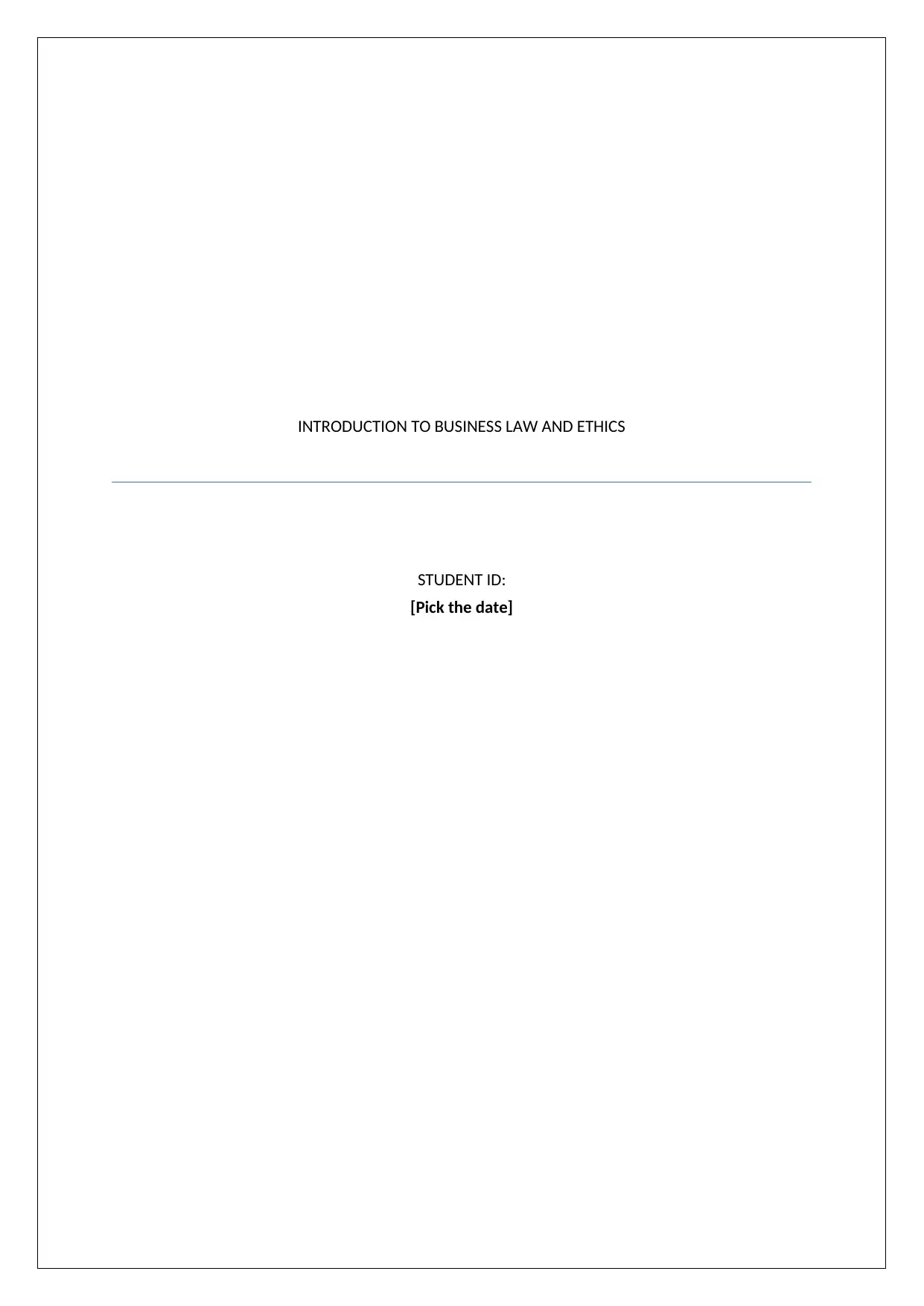
INTRODUCTION TO BUSINESS LAW AND ETHICS
STUDENT ID:
[Pick the date]
STUDENT ID:
[Pick the date]
Paraphrase This Document
Need a fresh take? Get an instant paraphrase of this document with our AI Paraphraser
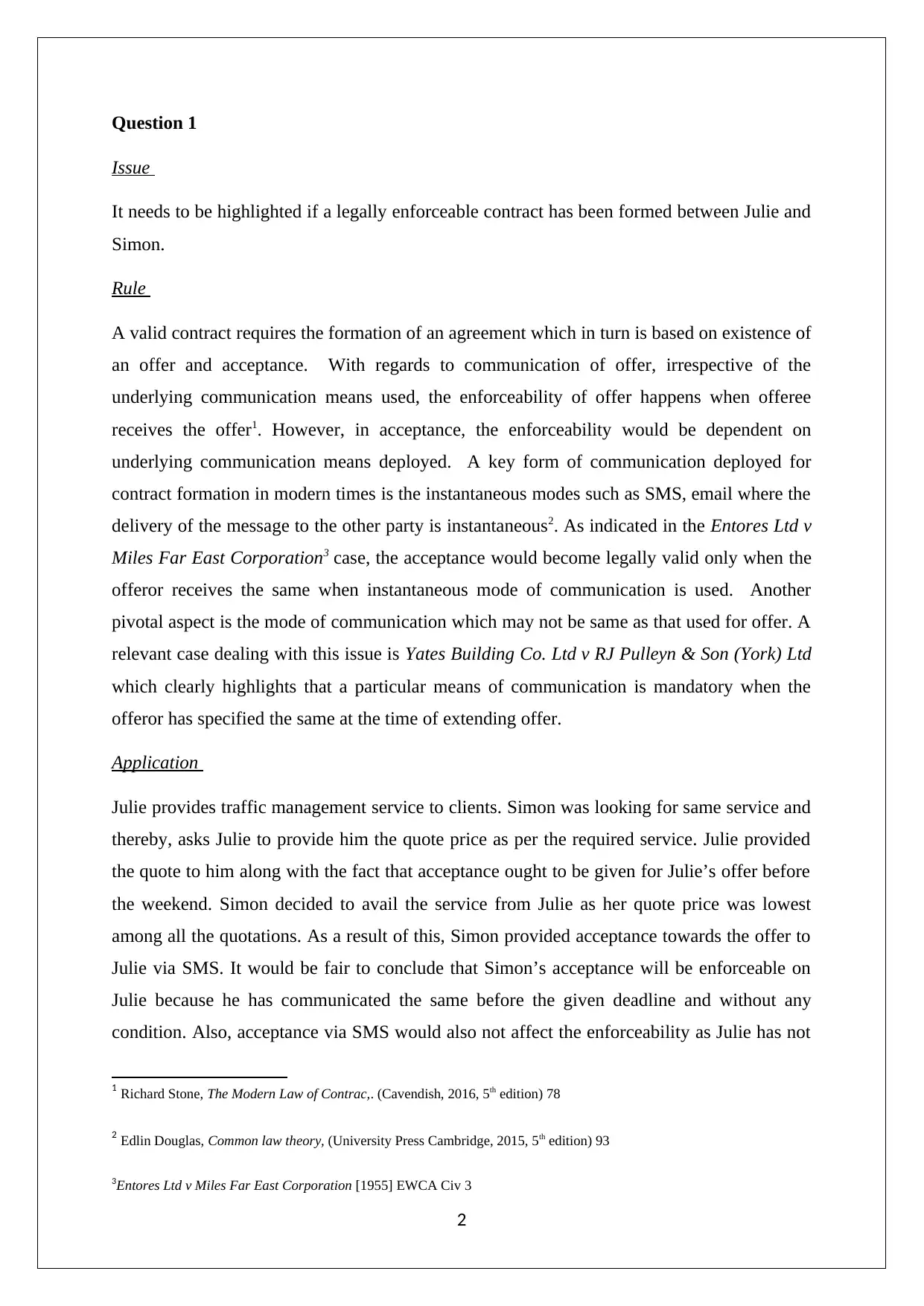
Question 1
Issue
It needs to be highlighted if a legally enforceable contract has been formed between Julie and
Simon.
Rule
A valid contract requires the formation of an agreement which in turn is based on existence of
an offer and acceptance. With regards to communication of offer, irrespective of the
underlying communication means used, the enforceability of offer happens when offeree
receives the offer1. However, in acceptance, the enforceability would be dependent on
underlying communication means deployed. A key form of communication deployed for
contract formation in modern times is the instantaneous modes such as SMS, email where the
delivery of the message to the other party is instantaneous2. As indicated in the Entores Ltd v
Miles Far East Corporation3 case, the acceptance would become legally valid only when the
offeror receives the same when instantaneous mode of communication is used. Another
pivotal aspect is the mode of communication which may not be same as that used for offer. A
relevant case dealing with this issue is Yates Building Co. Ltd v RJ Pulleyn & Son (York) Ltd
which clearly highlights that a particular means of communication is mandatory when the
offeror has specified the same at the time of extending offer.
Application
Julie provides traffic management service to clients. Simon was looking for same service and
thereby, asks Julie to provide him the quote price as per the required service. Julie provided
the quote to him along with the fact that acceptance ought to be given for Julie’s offer before
the weekend. Simon decided to avail the service from Julie as her quote price was lowest
among all the quotations. As a result of this, Simon provided acceptance towards the offer to
Julie via SMS. It would be fair to conclude that Simon’s acceptance will be enforceable on
Julie because he has communicated the same before the given deadline and without any
condition. Also, acceptance via SMS would also not affect the enforceability as Julie has not
1 Richard Stone, The Modern Law of Contrac,. (Cavendish, 2016, 5th edition) 78
2 Edlin Douglas, Common law theory, (University Press Cambridge, 2015, 5th edition) 93
3Entores Ltd v Miles Far East Corporation [1955] EWCA Civ 3
2
Issue
It needs to be highlighted if a legally enforceable contract has been formed between Julie and
Simon.
Rule
A valid contract requires the formation of an agreement which in turn is based on existence of
an offer and acceptance. With regards to communication of offer, irrespective of the
underlying communication means used, the enforceability of offer happens when offeree
receives the offer1. However, in acceptance, the enforceability would be dependent on
underlying communication means deployed. A key form of communication deployed for
contract formation in modern times is the instantaneous modes such as SMS, email where the
delivery of the message to the other party is instantaneous2. As indicated in the Entores Ltd v
Miles Far East Corporation3 case, the acceptance would become legally valid only when the
offeror receives the same when instantaneous mode of communication is used. Another
pivotal aspect is the mode of communication which may not be same as that used for offer. A
relevant case dealing with this issue is Yates Building Co. Ltd v RJ Pulleyn & Son (York) Ltd
which clearly highlights that a particular means of communication is mandatory when the
offeror has specified the same at the time of extending offer.
Application
Julie provides traffic management service to clients. Simon was looking for same service and
thereby, asks Julie to provide him the quote price as per the required service. Julie provided
the quote to him along with the fact that acceptance ought to be given for Julie’s offer before
the weekend. Simon decided to avail the service from Julie as her quote price was lowest
among all the quotations. As a result of this, Simon provided acceptance towards the offer to
Julie via SMS. It would be fair to conclude that Simon’s acceptance will be enforceable on
Julie because he has communicated the same before the given deadline and without any
condition. Also, acceptance via SMS would also not affect the enforceability as Julie has not
1 Richard Stone, The Modern Law of Contrac,. (Cavendish, 2016, 5th edition) 78
2 Edlin Douglas, Common law theory, (University Press Cambridge, 2015, 5th edition) 93
3Entores Ltd v Miles Far East Corporation [1955] EWCA Civ 3
2
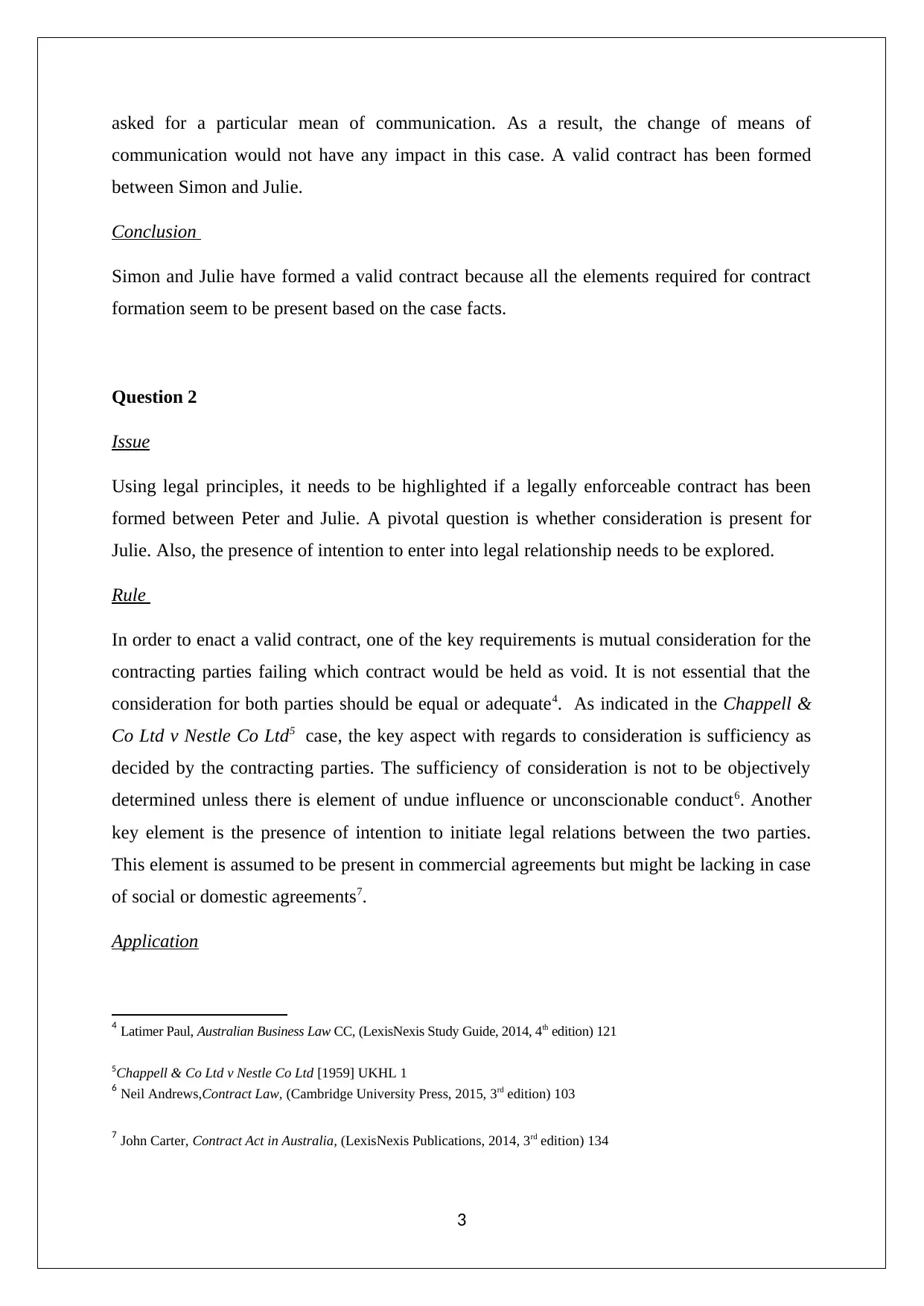
asked for a particular mean of communication. As a result, the change of means of
communication would not have any impact in this case. A valid contract has been formed
between Simon and Julie.
Conclusion
Simon and Julie have formed a valid contract because all the elements required for contract
formation seem to be present based on the case facts.
Question 2
Issue
Using legal principles, it needs to be highlighted if a legally enforceable contract has been
formed between Peter and Julie. A pivotal question is whether consideration is present for
Julie. Also, the presence of intention to enter into legal relationship needs to be explored.
Rule
In order to enact a valid contract, one of the key requirements is mutual consideration for the
contracting parties failing which contract would be held as void. It is not essential that the
consideration for both parties should be equal or adequate4. As indicated in the Chappell &
Co Ltd v Nestle Co Ltd5 case, the key aspect with regards to consideration is sufficiency as
decided by the contracting parties. The sufficiency of consideration is not to be objectively
determined unless there is element of undue influence or unconscionable conduct6. Another
key element is the presence of intention to initiate legal relations between the two parties.
This element is assumed to be present in commercial agreements but might be lacking in case
of social or domestic agreements7.
Application
4 Latimer Paul, Australian Business Law CC, (LexisNexis Study Guide, 2014, 4th edition) 121
5Chappell & Co Ltd v Nestle Co Ltd [1959] UKHL 1
6 Neil Andrews,Contract Law, (Cambridge University Press, 2015, 3rd edition) 103
7 John Carter, Contract Act in Australia, (LexisNexis Publications, 2014, 3rd edition) 134
3
communication would not have any impact in this case. A valid contract has been formed
between Simon and Julie.
Conclusion
Simon and Julie have formed a valid contract because all the elements required for contract
formation seem to be present based on the case facts.
Question 2
Issue
Using legal principles, it needs to be highlighted if a legally enforceable contract has been
formed between Peter and Julie. A pivotal question is whether consideration is present for
Julie. Also, the presence of intention to enter into legal relationship needs to be explored.
Rule
In order to enact a valid contract, one of the key requirements is mutual consideration for the
contracting parties failing which contract would be held as void. It is not essential that the
consideration for both parties should be equal or adequate4. As indicated in the Chappell &
Co Ltd v Nestle Co Ltd5 case, the key aspect with regards to consideration is sufficiency as
decided by the contracting parties. The sufficiency of consideration is not to be objectively
determined unless there is element of undue influence or unconscionable conduct6. Another
key element is the presence of intention to initiate legal relations between the two parties.
This element is assumed to be present in commercial agreements but might be lacking in case
of social or domestic agreements7.
Application
4 Latimer Paul, Australian Business Law CC, (LexisNexis Study Guide, 2014, 4th edition) 121
5Chappell & Co Ltd v Nestle Co Ltd [1959] UKHL 1
6 Neil Andrews,Contract Law, (Cambridge University Press, 2015, 3rd edition) 103
7 John Carter, Contract Act in Australia, (LexisNexis Publications, 2014, 3rd edition) 134
3
⊘ This is a preview!⊘
Do you want full access?
Subscribe today to unlock all pages.

Trusted by 1+ million students worldwide
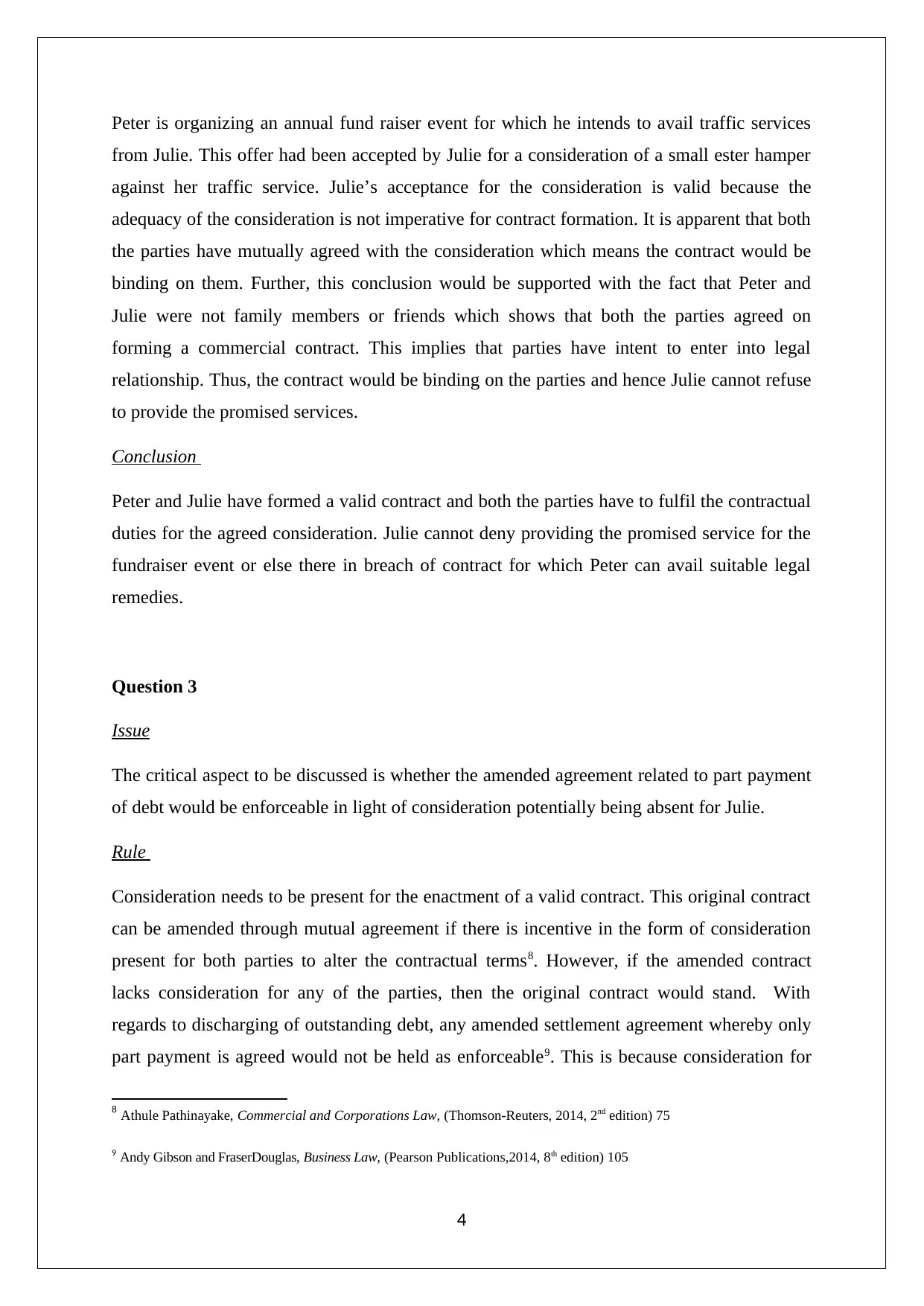
Peter is organizing an annual fund raiser event for which he intends to avail traffic services
from Julie. This offer had been accepted by Julie for a consideration of a small ester hamper
against her traffic service. Julie’s acceptance for the consideration is valid because the
adequacy of the consideration is not imperative for contract formation. It is apparent that both
the parties have mutually agreed with the consideration which means the contract would be
binding on them. Further, this conclusion would be supported with the fact that Peter and
Julie were not family members or friends which shows that both the parties agreed on
forming a commercial contract. This implies that parties have intent to enter into legal
relationship. Thus, the contract would be binding on the parties and hence Julie cannot refuse
to provide the promised services.
Conclusion
Peter and Julie have formed a valid contract and both the parties have to fulfil the contractual
duties for the agreed consideration. Julie cannot deny providing the promised service for the
fundraiser event or else there in breach of contract for which Peter can avail suitable legal
remedies.
Question 3
Issue
The critical aspect to be discussed is whether the amended agreement related to part payment
of debt would be enforceable in light of consideration potentially being absent for Julie.
Rule
Consideration needs to be present for the enactment of a valid contract. This original contract
can be amended through mutual agreement if there is incentive in the form of consideration
present for both parties to alter the contractual terms8. However, if the amended contract
lacks consideration for any of the parties, then the original contract would stand. With
regards to discharging of outstanding debt, any amended settlement agreement whereby only
part payment is agreed would not be held as enforceable9. This is because consideration for
8 Athule Pathinayake, Commercial and Corporations Law, (Thomson-Reuters, 2014, 2nd edition) 75
9 Andy Gibson and FraserDouglas, Business Law, (Pearson Publications,2014, 8th edition) 105
4
from Julie. This offer had been accepted by Julie for a consideration of a small ester hamper
against her traffic service. Julie’s acceptance for the consideration is valid because the
adequacy of the consideration is not imperative for contract formation. It is apparent that both
the parties have mutually agreed with the consideration which means the contract would be
binding on them. Further, this conclusion would be supported with the fact that Peter and
Julie were not family members or friends which shows that both the parties agreed on
forming a commercial contract. This implies that parties have intent to enter into legal
relationship. Thus, the contract would be binding on the parties and hence Julie cannot refuse
to provide the promised services.
Conclusion
Peter and Julie have formed a valid contract and both the parties have to fulfil the contractual
duties for the agreed consideration. Julie cannot deny providing the promised service for the
fundraiser event or else there in breach of contract for which Peter can avail suitable legal
remedies.
Question 3
Issue
The critical aspect to be discussed is whether the amended agreement related to part payment
of debt would be enforceable in light of consideration potentially being absent for Julie.
Rule
Consideration needs to be present for the enactment of a valid contract. This original contract
can be amended through mutual agreement if there is incentive in the form of consideration
present for both parties to alter the contractual terms8. However, if the amended contract
lacks consideration for any of the parties, then the original contract would stand. With
regards to discharging of outstanding debt, any amended settlement agreement whereby only
part payment is agreed would not be held as enforceable9. This is because consideration for
8 Athule Pathinayake, Commercial and Corporations Law, (Thomson-Reuters, 2014, 2nd edition) 75
9 Andy Gibson and FraserDouglas, Business Law, (Pearson Publications,2014, 8th edition) 105
4
Paraphrase This Document
Need a fresh take? Get an instant paraphrase of this document with our AI Paraphraser
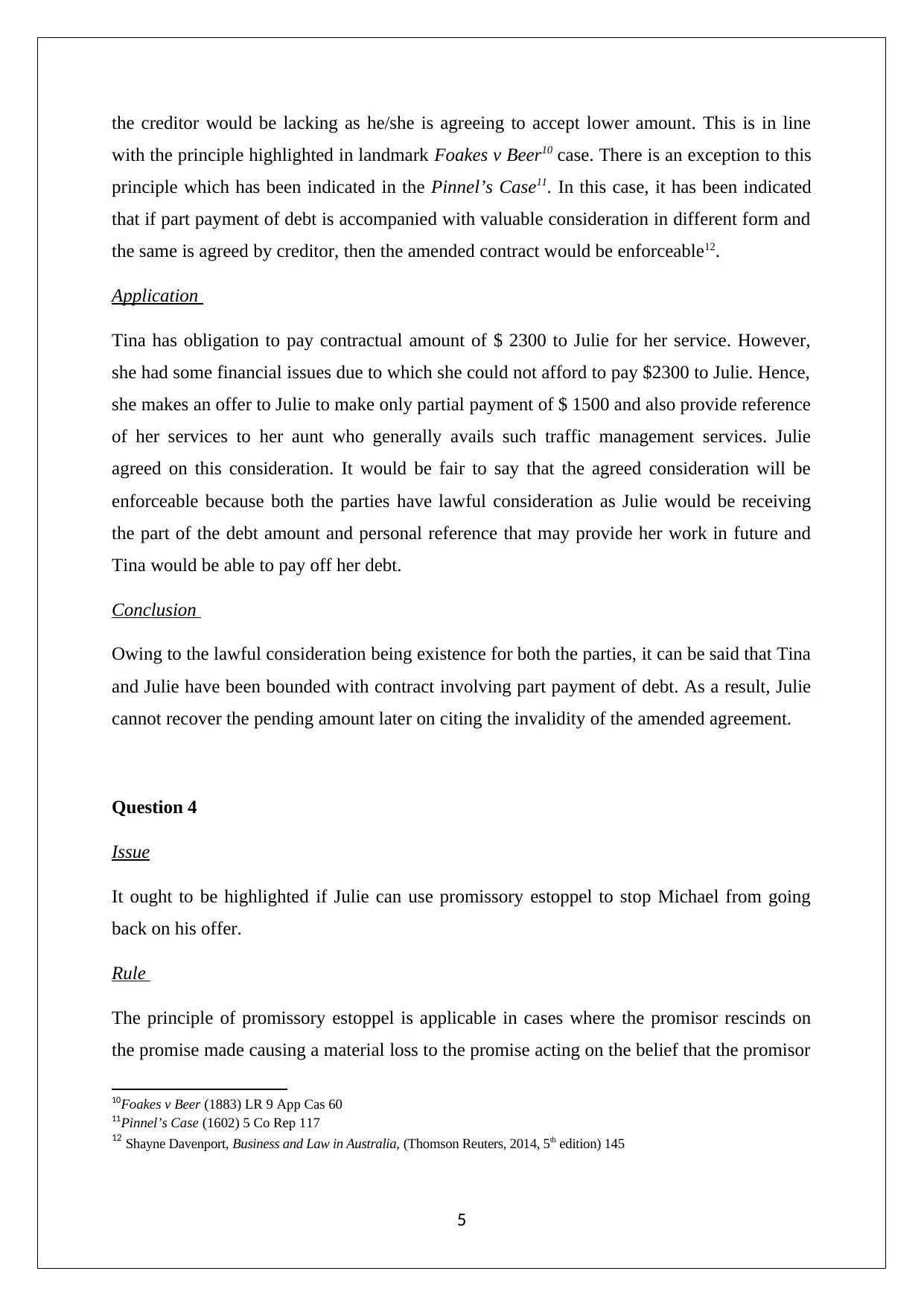
the creditor would be lacking as he/she is agreeing to accept lower amount. This is in line
with the principle highlighted in landmark Foakes v Beer10 case. There is an exception to this
principle which has been indicated in the Pinnel’s Case11. In this case, it has been indicated
that if part payment of debt is accompanied with valuable consideration in different form and
the same is agreed by creditor, then the amended contract would be enforceable12.
Application
Tina has obligation to pay contractual amount of $ 2300 to Julie for her service. However,
she had some financial issues due to which she could not afford to pay $2300 to Julie. Hence,
she makes an offer to Julie to make only partial payment of $ 1500 and also provide reference
of her services to her aunt who generally avails such traffic management services. Julie
agreed on this consideration. It would be fair to say that the agreed consideration will be
enforceable because both the parties have lawful consideration as Julie would be receiving
the part of the debt amount and personal reference that may provide her work in future and
Tina would be able to pay off her debt.
Conclusion
Owing to the lawful consideration being existence for both the parties, it can be said that Tina
and Julie have been bounded with contract involving part payment of debt. As a result, Julie
cannot recover the pending amount later on citing the invalidity of the amended agreement.
Question 4
Issue
It ought to be highlighted if Julie can use promissory estoppel to stop Michael from going
back on his offer.
Rule
The principle of promissory estoppel is applicable in cases where the promisor rescinds on
the promise made causing a material loss to the promise acting on the belief that the promisor
10Foakes v Beer (1883) LR 9 App Cas 60
11Pinnel’s Case (1602) 5 Co Rep 117
12 Shayne Davenport, Business and Law in Australia, (Thomson Reuters, 2014, 5th edition) 145
5
with the principle highlighted in landmark Foakes v Beer10 case. There is an exception to this
principle which has been indicated in the Pinnel’s Case11. In this case, it has been indicated
that if part payment of debt is accompanied with valuable consideration in different form and
the same is agreed by creditor, then the amended contract would be enforceable12.
Application
Tina has obligation to pay contractual amount of $ 2300 to Julie for her service. However,
she had some financial issues due to which she could not afford to pay $2300 to Julie. Hence,
she makes an offer to Julie to make only partial payment of $ 1500 and also provide reference
of her services to her aunt who generally avails such traffic management services. Julie
agreed on this consideration. It would be fair to say that the agreed consideration will be
enforceable because both the parties have lawful consideration as Julie would be receiving
the part of the debt amount and personal reference that may provide her work in future and
Tina would be able to pay off her debt.
Conclusion
Owing to the lawful consideration being existence for both the parties, it can be said that Tina
and Julie have been bounded with contract involving part payment of debt. As a result, Julie
cannot recover the pending amount later on citing the invalidity of the amended agreement.
Question 4
Issue
It ought to be highlighted if Julie can use promissory estoppel to stop Michael from going
back on his offer.
Rule
The principle of promissory estoppel is applicable in cases where the promisor rescinds on
the promise made causing a material loss to the promise acting on the belief that the promisor
10Foakes v Beer (1883) LR 9 App Cas 60
11Pinnel’s Case (1602) 5 Co Rep 117
12 Shayne Davenport, Business and Law in Australia, (Thomson Reuters, 2014, 5th edition) 145
5
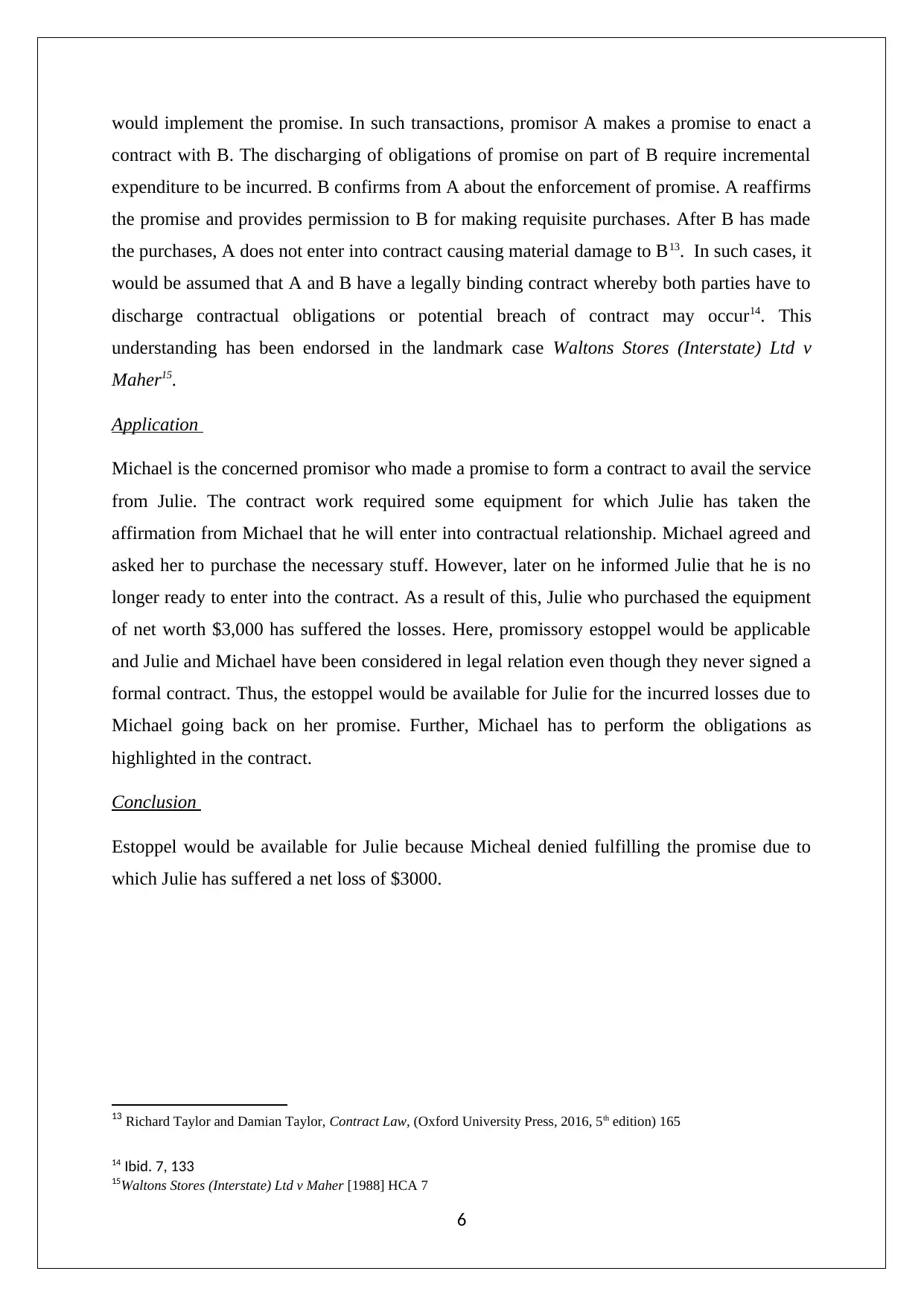
would implement the promise. In such transactions, promisor A makes a promise to enact a
contract with B. The discharging of obligations of promise on part of B require incremental
expenditure to be incurred. B confirms from A about the enforcement of promise. A reaffirms
the promise and provides permission to B for making requisite purchases. After B has made
the purchases, A does not enter into contract causing material damage to B13. In such cases, it
would be assumed that A and B have a legally binding contract whereby both parties have to
discharge contractual obligations or potential breach of contract may occur14. This
understanding has been endorsed in the landmark case Waltons Stores (Interstate) Ltd v
Maher15.
Application
Michael is the concerned promisor who made a promise to form a contract to avail the service
from Julie. The contract work required some equipment for which Julie has taken the
affirmation from Michael that he will enter into contractual relationship. Michael agreed and
asked her to purchase the necessary stuff. However, later on he informed Julie that he is no
longer ready to enter into the contract. As a result of this, Julie who purchased the equipment
of net worth $3,000 has suffered the losses. Here, promissory estoppel would be applicable
and Julie and Michael have been considered in legal relation even though they never signed a
formal contract. Thus, the estoppel would be available for Julie for the incurred losses due to
Michael going back on her promise. Further, Michael has to perform the obligations as
highlighted in the contract.
Conclusion
Estoppel would be available for Julie because Micheal denied fulfilling the promise due to
which Julie has suffered a net loss of $3000.
13 Richard Taylor and Damian Taylor, Contract Law, (Oxford University Press, 2016, 5th edition) 165
14 Ibid. 7, 133
15Waltons Stores (Interstate) Ltd v Maher [1988] HCA 7
6
contract with B. The discharging of obligations of promise on part of B require incremental
expenditure to be incurred. B confirms from A about the enforcement of promise. A reaffirms
the promise and provides permission to B for making requisite purchases. After B has made
the purchases, A does not enter into contract causing material damage to B13. In such cases, it
would be assumed that A and B have a legally binding contract whereby both parties have to
discharge contractual obligations or potential breach of contract may occur14. This
understanding has been endorsed in the landmark case Waltons Stores (Interstate) Ltd v
Maher15.
Application
Michael is the concerned promisor who made a promise to form a contract to avail the service
from Julie. The contract work required some equipment for which Julie has taken the
affirmation from Michael that he will enter into contractual relationship. Michael agreed and
asked her to purchase the necessary stuff. However, later on he informed Julie that he is no
longer ready to enter into the contract. As a result of this, Julie who purchased the equipment
of net worth $3,000 has suffered the losses. Here, promissory estoppel would be applicable
and Julie and Michael have been considered in legal relation even though they never signed a
formal contract. Thus, the estoppel would be available for Julie for the incurred losses due to
Michael going back on her promise. Further, Michael has to perform the obligations as
highlighted in the contract.
Conclusion
Estoppel would be available for Julie because Micheal denied fulfilling the promise due to
which Julie has suffered a net loss of $3000.
13 Richard Taylor and Damian Taylor, Contract Law, (Oxford University Press, 2016, 5th edition) 165
14 Ibid. 7, 133
15Waltons Stores (Interstate) Ltd v Maher [1988] HCA 7
6
⊘ This is a preview!⊘
Do you want full access?
Subscribe today to unlock all pages.

Trusted by 1+ million students worldwide
1 out of 6
Related Documents
Your All-in-One AI-Powered Toolkit for Academic Success.
+13062052269
info@desklib.com
Available 24*7 on WhatsApp / Email
![[object Object]](/_next/static/media/star-bottom.7253800d.svg)
Unlock your academic potential
Copyright © 2020–2026 A2Z Services. All Rights Reserved. Developed and managed by ZUCOL.





